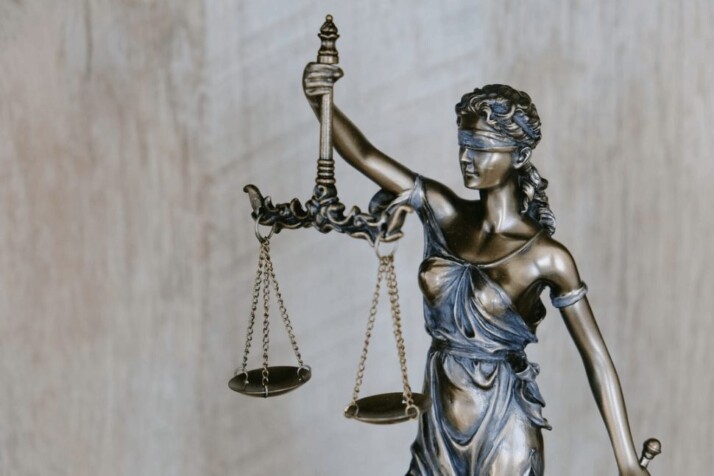Plagiarism is an ethical infraction and an offense against your school or workplace’s honor code, you know. You can face sanctions from your school, and your employers may fire you.
In the most severe cases, your entire career may be dead in the water, and you will be unemployable. What about the legal implications of plagiarism?
Can a plagiarist be sued or faced with criminal charges? Is plagiarism illegal? In this article, we will take a look at the legal repercussions of plagiarism.
What is Plagiarism?

When you use someone else’s work and do not attribute that work to the author, you are committing plagiarism. Examples include copying text verbatim, paraphrasing a phrase, or summarizing an idea. Plagiarism occurs when a writer fails to:
- Cite quotes or ideas written by another author,
- Include direct text in quotation marks without proper citation,
- Write summaries and paraphrases in their own words.
Plagiarism has been an issue in universities for years, but it has become even more common with the rise of the Internet. Using search engines, you can find thousands of authors’ works immediately, which can then be copied and pasted into books, articles, etc.
Almost all topics are covered on many websites today, so students can copy others’ work and present it as their own. Some of these websites, sometimes called “paper mills,” offer completed papers, while others allow students to trade their completed papers among themselves.
Non-Legal Consequences of Plagiarism
There must be a real understanding that it is illegal and a serious offense that leads to penalties. The penalties vary greatly from college to college.
If your paper is not written from scratch, you may receive an F, or you may be dismissed from the course for some time. If it was a must course, you are going to have to take the course again in the next semester. Keep up plagiarizing, and you will be expelled from your school indefinitely.
If you are writing professionally or academically, you probably recognize the dangers associated with plagiarism. The act of using someone else’s writing or ideas without proper attribution is considered an ethical offense.
Plagiarizing can lead to immediate dismissal. If you laid off from your job because of plagiarism, it’s going to be difficult to get a similar job in the industry.
In the harshest instances, your career will be dead in the water as you can’t publish more research.
Is Plagiarism Illegal?
But what about the legal consequences? Can a plagiarist get sued or face criminal action?
Plagiarism is not always illegal in the real world. Legal professionals state that plagiarism is not illegal in the United States. But when it occurs, it’s a violation of honors or ethics codes within the educational institutions where the offense is committed.
This discussion is largely dependent on whom the plagiarist is and how they went about plagiarizing. As far as the law goes, plagiarism is not mentioned in any United States law.
Instead, these laws apply to copyrights and how they apply to created works. Therefore, understanding plagiarism requires understanding copyright laws.
Copyright infringement is the most obvious way plagiarism can become a legal issue.
A copyright is a set of exclusive rights granted to original work. Often, plagiarizing violates those rights both by copying the work without permission and distributing it.
Plagiarism is not always harmful to copyright. A copyright violation may not occur, for example, if one plagiarizes from sources outside copyright (meaning public domain) without breaking any laws.
For the time being, plagiarism rarely becomes a criminal or civil matter, especially when it occurs in the classroom. It can and does happen, however.
To Wrap Up
So, is plagiarism illegal? It depends, but in most instances, it is not the case. It not being illegal does not mean you should plagiarize to your heart’s content, though! There are catastrophic consequences to plagiarism, and it should be avoided at all costs.
Explore All Plagiarism Checker Articles
Plagiarism in Journalism: Its Meaning and How to Avoid It
Writing is a wide array of interests that covers different professions and passions. In terms of news writing, journalists should…
The Difference Between Plagiarism and Appropriation in Art
People confuse the difference between plagiarism and appropriation. What they don’t understand is that these two terms differ from one…
6 Ways to Write Plagiarism Free Content — A Bloggers Guide
Generating unique plagiarism free content is one of the most important factors for optimizing your content and achieving higher SERP…
Using Plagiarism Checkers for Research Papers
With the web being so vast and expansive, it’s no wonder more, and more people are turning to it for…
6 Best Free Plagiarism Checker Online
What is the best free plagiarism checker today? You might have a paper or assignment due in the upcoming day,…
How to Copy and Paste Without Plagiarizing
The copy and paste function in your word processor is powerful. It can save your lots of time. But it…
